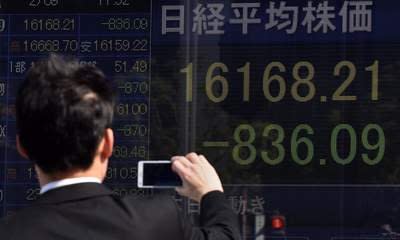FTSE Higher Despite Nikkei's 5% Plunge

European stock markets have posted modest gains this morning following yesterday's rout which saw the FTSE 100 (NasdaqGS: Z - news) hit a four-year low.
The UK market was led higher by Rolls Royce this morning which despite announcing a cut to its dividend saw its share price jump 16%.
The index of the UK's 100 largest listed companies has shed nearly 10% of its value so far this year, equivalent to a financial loss of over £160bn.
Global markets have taken a fresh dive amid heightened concerns over the state of the world economy - with US Federal Reserve chair Janet Yellen on Wednesday admitting evidence of greater risks, despite the Fed raising US interest rates in December citing a rosy outlook.
Only eight FTSE 100 stocks are in positive territory this year, while 10 have lost more than a quarter of their value and we are not even seven weeks into the new year.
Among the biggest losers are the banks with Barclays (LSE: BARC.L - news) 32% lower and RBS (LSE: RBS.L - news) down 26%.
Meanwhile, gold enjoyed its best daily gain since 2011 yesterday as investors fled from risky stocks to pile into the safe-haven commodity - driving strong gains for UK-listed gold miners Randgold and Fresnillo (Other OTC: FNLPF - news) . The precious metal's price has risen 17% so far this year.
Other central banks - including the European Central Bank and the Bank of Japan - have been cutting rates to try to stoke economic activity.
Despite implementing negative interest rates the Japanese currency, the yen, has also earned itself safe haven status. The Yen is poised for its biggest fortnightly gain against the dollar since 1998.
The underlying volatility stems from fears that despite action from global central banks equity markets have continued to slide and that further tools or weapons with which to address these fears may have been fully exhausted
Many also argue that negative interest rates hurt banks' profitability.
Markets are also mindful of the impact of oil. Although the Bank of England says that lower prices are good for the UK economy as a whole the firms that fund our pensions are often heavily exposed to the value of 'black gold' which has fallen nearly 44% over the last year.
Concerns aren't exclusive to equity markets, Portugal's government bonds are weathering their worst week since January 2012 following fears that its investment grade rate is under threat.

 Yahoo Finance
Yahoo Finance 